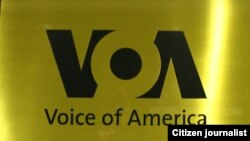“ສະບາຍດີ ນີ້ແມ່ນນິວຢອກ ໂທຫາ.” ນັ້ນຄືຄຳເວົ້າໃນພາສາຣັດເຊຍ ທີ່ໄດ້ກະ
ຈາຍສຽງອອກ ໄປ ໃນຄື້ນອາກາດຂອງຣັດເຊຍ ເມື່ອວັນທີ 17 ເດືອນກຸມພາປີ
1947 ຊຶ່ງເປັນການອອກອາກາດ ພາກພາສາຣັດເຊຍເທື່ອທຳອິດຂອງສຽງ
ອາເມຣິກາ.
ການອອກອາກາດດັ່ງກ່າວແມ່ນພາກສ່ວນນຶ່ງໃນການໂຄສະນາຂອງສະຫະລັດ ຕ້ານສະຫະພາບໂຊຫວຽດ ທີ່ມອງເຫັນວ່າເປັນການຂົ່ມຂູ່ໃໝ່ຫລັງຈາກສົງຄາມ ໂລກຄັ້ງທີ 2 ໄດ້ສິ້ນສຸດລົງໃນປີ 1945.
ວີໂອເອ ຊຶ່ງໄດ້ເລີ້ມຂຶ້ນໃນລະຫວ່າງສົງຄາມ ເພື່ອເປັນຊ່ອງທາງນຳເອົາຂ່າວ
ແລະນະໂຍຍາຍຂອງອາເມຣິກັນໄປສູ່ບັນດາເຂດຍຶດຄອງຕ່າງໆ ໄດ້ບອກໃຫ້
ພວກຜູ້ຟັງຊາວຣັດເຊຍຮູ້ວ່າ ມັນມີຈຸດປະສົງທີ່ຈະ “ແຈ້ງໃຫ້ຜູ້ຟັງຢູ່ໃນສະຫະ
ພາບໂຊຫວຽດ ເຫັນຮູບພາບກ່ຽວກັບຊີວິດຂອງອາເມຣິກາ.” ຄືກັນກັບພາສາ
ອື່ນໆ ພາກພາສາຣັດເຊຍຂອງວີໂອເອ ກໍມີຈຸດປະສົງທີ່ຈະແຈ້ງໃຫ້ຜູ້ຟັງໄດ້ຮູ້
“ຢ່າງຈະແຈ້ງ ແລະບໍ່ໄດ້ມີການດັດແປງຄວາມຈິງ” ກ່ຽວກັບຊີວິດຢູ່ຮອກເໜືອ
ໄປຈາກຊາຍແດນຂອງໂຊຫວຽດ.
ລາຍການທຳອິດ ບັນຈຸດ້ວຍຂ່າວປະສົມ ດົນຕີ ແລະເລື່ອງທີ່ໜ້າສົນໃຈຕ່າງໆ
ຂອງມະນຸດ ພ້ອມດ້ວຍລາຍການທີ່ໄດ້ເສີມເຂົ້າຕື່ມ ແລະຫຼາຍຂຶ້ນ ໄປສູ່ດົນຕີ
ໂດຍສະເພາະແມ່ນ jazz ທີ່ເປັນດົນຕີຊາວອາເມຣິກັນທີ່ແປກໆອັນອັນເປັນ
ນະວັດຕະກຳທີ່ໄດ້ຮັບຄວາມນິຍົມຊົມຊອບຢ່າງຫລວງຫລາຍຢູ່ໃນຣັດເຊຍ
ແລະແຫ່ງອື່ນໆໃນຕ່າງປະເທດ.
ແຕ່ວ່າລັດຖະບານໂຊຫວຽດໄດ້ຕໍ່ສູ້ຕ້ານຄືນ. ໃນເດືອນເມສາປີ 1947 ພຽງ
ແຕ່ສອງເດືອນ ຫລັງຈາກການອອກອາກາດໄດ້ເລີ້ມຂຶ້ນໂຊຫວຽດກໍເລີ້ມສົ່ງ
ສັນຍານ ອີເລັກໂທຣນິກລົບກວນຄື້ນວິທະຍຸ ໃນຄວາມພະຍາຍາມທີ່ຈະປິດ
ອິດທິພົນຂອງ ອາເມຣິກັນ.
ບັນດາຜູ້ຕິຕຽນຂອງວີໂອເອໄດ້ຈົ່ມວ່າ ການສົ່ງສັນຍານລົບກວນຢູ່ໃນໂຊ
ຫວຽດ ແລະແຫ່ງອື່ນໆ ທີ່ສະຫະລັດໄດ້ອອກອາກາດໄປນັ້ນບໍ່ໄດ້ເປັນທີ່ຍີນ
ດີນຳ ແລະມີຄວາມລຳບາກທີ່ວັດແທກກ່ຽວກັບປະສິດທິຜົນໃນການອອກອາ
ກາດຂອງອາເມ ຣິກັນ.
ແຕ່ລາຍການຂອງວີໂອເອໃນທີ່ສຸດໄດ້ແຜ່ຂະຫຍາຍອອກໄປໂດຍທາງອອນ
ລາຍ ໂດຍລາຍການທາງອິນເຕີແນັດນຳສະເໜີເທື່ອທຳອິດໃນປີ 1994.
ໃນໄລຍະນຶ່ງທົດສະວັດເຄິ່ງຕໍ່ມາ ບັນດາເຈົ້າໜ້າທີ່ສະຫະລັດ ໄດ້ຮັບມືກັບ
ການແຕກແຍກຂອງສະຫະພາບໂຊຫວຽດ ດ້ວຍການປ່ຽນແປງລາຍການ
ຮວມທັງເພີ້ມລາຍການ ພາສາໃນແຫລມ Balkan ແລະຕັດພາສາອັງກິດ
ຢູ່ໃນພາກຕາເວັນອອກກາງລົງ.
"Hello, this is New York calling." The words, in Russian, hit Russian airwaves on February 17, 1947 -- the first Russian broadcast of the Voice of America.
The broadcasts were an integral part of the United States' propaganda campaign against the Soviet Union, which was seen as the new threat once World War Two was over in 1945.
VOA, which began during the war as a way to convey American news and policies to occupied areas, told its Russian listeners it was meant to "give listeners in the USSR a picture of life in America." Like its other services, VOA's Russian service meant to give its audience the "pure and unadulterated truth" about life beyond Soviet borders.
The first programs contained a mix of news, music and human interest stories, with programs skewing more and more toward music, particularly jazz, a distinctly American musical innovation that gained considerable popularity in Russia and elsewhere overseas.
But the Soviet government fought back. In April 1947, just over two months after the broadcasts started, the Soviets began jamming the radio signal electronically in an effort to shut out American influence.
Critics of VOA complained that the signal jamming in the Soviet Union and elsewhere that U.S. broadcasts were unwelcome made it very difficult to gauge the effectiveness of the American broadcasts.
But VOA programming eventually spread online, with the first Internet programming posted in 1994.
Over the next decade and a half, U.S. authorities responded to the breakup of the Soviet Union with changes in programming, including the addition of Balkan-language programming and cuts to English programming in the Middle East.
By 2008, officials had decided to cut Russian broadcasts and provide VOA services in Russian on the Internet only. A former spokeswoman for VOA, Tish King, told the investigative news organization Propublica that Russian jamming made the region "a really challenging market," leading to the decision to make the programming online-only.




